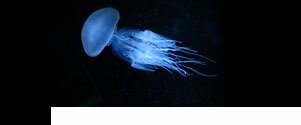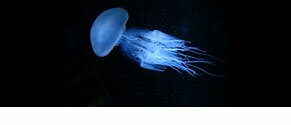Jellyfish Facts
Jellyfish Facts - Both Friend And Foe
It's not too difficult to compile a list of interesting jellyfish facts as the jellyfish is certainly one of the more interesting creatures one can come upon. Jellyfish can be quite large or quite small, beautiful to behold, blob-like in appearance, or transparent to the point of being invisible. Jellyfish can be harmless to humans, most of them are, but some can be deadly.
It seems like most jellyfish facts cited relate to the tentacles and how those tentacles should be avoided. Certainly, it isn't advisable to touch one, unless you know your jellyfish. Even the semi-transparent ones that look like small umbrellas can sometimes give a nasty sting, though most are harmless. All jellyfish sting, that's how they survive, by paralyzing their prey. If their prey is plankton, chances are their sting would not be noticeable to a human. If their prey are fish, especially decent sized fish, the toxic in their tentacles could be quite potent.
Bad Guys - Even dead jellyfish can pack a punch when it comes to toxins in their tentacles. The toxin doesn't disappear immediately upon the jellyfish's death. Walk along a beach in Hawaii at certain times of the year and you may spot a number of Portuguese Man-O-War species which have washed up on the sand. They may be only an inch or two in diameter, with tentacles a bit longer, but step on one with bare feet and you'll know it! The deadliest jellyfish is the Box Jellyfish, also known as the Sea Wasp. Waders and swimmers in Australia have to watch out for this one as its sting can be lethal. A variety of the Sea Wasp frequents Hawaiian waters as well, but is less toxic than its Australian cousin and it sting is seldom lethal. Highly toxic jellyfish create problems in the fishing industry when captured in nets together with fish. The nets not only become fouled with toxic tentacles and may become useless, but the fish that are caught can become toxic as well and often have to be discarded.
Jellyfish Benefits - In spite of all the scare stories, there are a few jellyfish facts relating to some of the benefits these creatures provide. In some parts of the world, over-fishing has reduced the population of jellyfish predators, causing the jellyfish population to explode. While more and more jellyfish may not be considered a good thing by many, the increasing population serves a purpose. In this respect the jellyfish plays a role similar to that of the canary in the coal mine. When there are toxic gases in the coal mine, the canary stops singing, when fisheries are being depleted or the local marine ecosystem is otherwise being damaged, the jellyfish population often explodes.
Glowing Protein - Another benefit the jellyfish has provided is found in the field of medical science. Some species of jellyfish glow in the dark. This ability has been traced to the presence of a fluorescent protein containing a gene which can be switched on and off. Medical scientists have been able to make use of this protein and its gene-controlled flashing ability, to trace the path of certain hormones through the human body. This work is helping to gain a better understanding of certain types of arthritis, and in addition has in some instances improved our knowledge of the workings of the autoimmune system. The jellyfish gene in a sense plays a role similar to a radioactive isotope in tracking certain bodily functions and mechanisms.
If It Quacks - There are other jellyfish facts which, if nothing else are just plain interesting. Jellyfish species range in size from less than an inch in diameter to up to several feet, with tentacles anywhere from a fraction of an inch long at one extreme, to 100 feet long at the other. There is even a freshwater jellyfish. Actually there isn't. As the saying goes, "If it walks like a duck, and quacks like a duck, it must be a duck". The freshwater jellyfish looks and acts (not quacks) like the saltwater version, but isn't a true jellyfish.
Jellyfish will probably always draw our attention. Watching them is something like watching fire. "Mesmerized" is probably the word that best applies.


